|
July, 2005
Aug. 2005
Sept. 2005
Oct. 2005
Nov. 2005
Dec. 2005
Jan. 2006
Feb. 2006
Mar. 2006
Apr. 2006
May 2006
June 2006
July 2006
August 2006
September 2006
October 2006
November 2006
December 2006
January 2007
February 2007
March 2007
April 2007
May 2007
June 2007
July 2007
August 2007
September 2007
October 2007
November 2007
December 2007
February 2008
March 2008
April 2008
May 2008
June 2008
July 2008
August 2008
September 2008
October 2008
November 2008
December 2008
February 2009
March 2009
April 2009
May 2009
July 2009
August 2009
September 2009
November 2009
December 2009
January 2010
February 2010
March 2010
April 2010
May 2010
June 2010
July 2010
September 2010
October 2010
November 2010
December 2010
January 2011
February 2011
March 2011
April 2011
May 2011
June 2011
July 2011
September 2011
October 2011
December 2011
February 2012
April 2012
June 2012
July 2012
August 2012
October 2012
November 2012
February 2013
ČERVENÁ BARVA PRESS NEWSLETTER
Gloria Mindock, Editor Issue No. 80 May, 2013
INDEX
Welcome to the May, 2013 Newsletter.
There was no newsletter for March or April.
In April, Cervena Barva Press celebrated its 8 year anniversary. Wow!
Bill and I work hard to get so many chapbooks and books published. It has been such an honor to publish
so many wonderful writers. We have so many more to go. Thank you so much. Thanks to everyone who has supported
Cervena Barva Press through the years and the many friendships made. Bill and I are just so grateful.
All of you have helped this press keep going. There are not enough words to express our appreciation.
Bill and I thank you a zillion times!!!
The press was founded in April, 2005 and since 2006, we have published 107 books. We have numerous
chapbooks/books being sent to the printer this month by
Jiri Klobouk, F.D. Reeve, Alan Elyshevitz,
Michelle Reale, Krikor Der-Hohanessian, Rodica Draghincescu, Susan Lewis, and
Joani Reese. Next month,
there will be just as many. We are working to catch up with our schedule and keep it on track.
In 2014, we will be accepting fewer manuscripts for publication.
AWP was wonderful and it was so great to see so many of you.
The panel, "The Look of the Book" went great. It was so nice to be a part of it.
Thanks Anne Coray for asking
me and thank you Lucy Lang Day and Doug Holder,
also on the panel. The Cervena Barva Press Reading at AWP also
went very well. The readers were Andrey Gritsman, Susan Lewis, Bill Yarrow
and Lucy Lang Day. A special thanks
to Bill Yarrow and Susan Lewis
for taking the place of 2 writers who could not make it. Everyone read
incredible work. Thank you!!! You all rocked!!!! Many of you helped at the booktable. That help was
much needed so thank you!
I met some of my authors for the first time and saw some I already knew. I even saw some
old friends I haven't seen in awhile.
It all was so special. I had a great time going
to dinner with Susan Lewis and Jonathan Penton.
Wonderful to see you both. After the Cervena Barva Press reading, some of us went out to dinner
and it was just the best to hang out and chat. I am truly lucky to have so many wonderful people
in my life.
In the Cervena Barva Press Studio
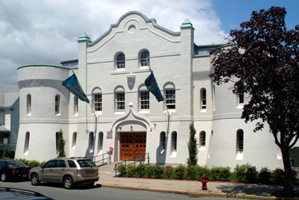
If you haven't checked out the Cervena Barva Press Studio at the Center for the
Arts at the Armory, 191 Highland Avenue, Basement, B8, in Somerville, I hope you will soon.
We have readings, workshops, and events going on in the space constantly.
It is heaven to have my own space for the press!
We have many of the Cervena Barva Press books and chapbooks there discounted. They are not discounted online.
In the summer, we will move The Lost Bookshelf Bookstore into the space. We also have a collection of used books
in the space. We have discontinued having used books online at The Lost Bookshelf.
Here are two photos of the Cervena Barva Press Studio.
(Photos courtesy of Irene Koronas)
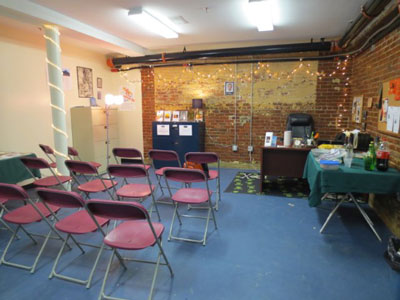
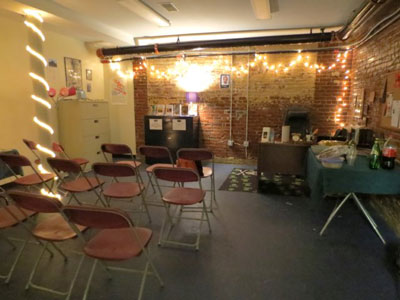
ANY AUTHORS PUBLISHED BY THE PRESS OR HAS FORTHCOMING BOOKS, are welcome to come read for the press.
You are responsible for your own expenses.
Contact me and we can arrange the details. Readings are open to others visiting the area.
You just need to let me know. I do prefer authors to have books out. If I am familiar with
your work, you don't need this. I believe in being good to emerging writers as well as
established writers. I also am working on giving back to the community here in Somerville
because the community has been so good to me. Many local authors have read in the space already.
Here are just a few photos of the Vaclav Havel Tribute, a writing workshop, and a few readings.
(Photos courtesy of Irene Koronas, Zvi A. Sesling, and Timothy Gager)
May Readings at the Cervena Barva Press Studio are:
May 3rd: Marcia Slatkin and George Capaccio May 8th: Bill 'Liam' Alberti, Charles Harper, Rene Schweisow (South Shore Poets) May 10th: Partridge Boswell and Tino Villanueva
Cervena Barva Press Studio
Center for the Arts at the Armory
191 Highland Avenue
Basement, ROOM B8
Somerville, MA
Author News
Congratulations to Linda Nemec Foster. Her chapbook, "Ten Songs from Bulgaria" published by Cervena Barva
Press in 2008, has been set to music by composer Laszlo Slomovits.
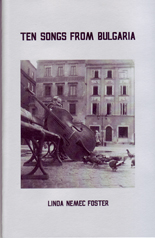
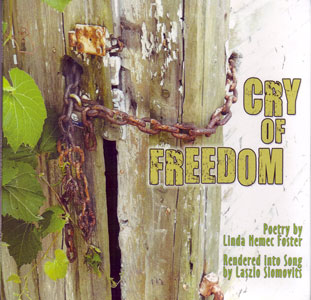
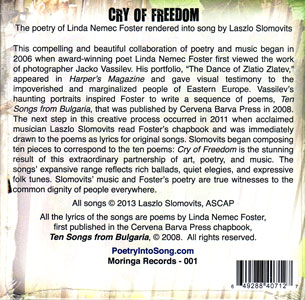
Order Ten Songs from Bulgaria here...
The CD is called "Cry from Freedom."
It is now available for sale at: http://poetryintosong.com/recordings/other.php
Congratulations to Flavia Cosma. She has returned from Lima, Peru and Buenos Aires, Argentina where she
celebrated her new book of poetry translated by Luis Raul Calvo of Beunos Aires. This is exciting!
Flavia is also getting ready for the writing festival in Val David, Ontario that she hosts. Writers from
all over the world attend this festival. Here is information on it:
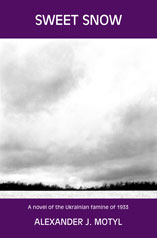
Alexander J. Motyl celebrated the publication of "Sweet Snow" on April 20th at the Ukrainian Museum in NYC.
Cervena Barva Press is happy to announce this publication. The book is available at The Lost Bookshelf for
pre-orders and will be shipped May 17th, 2013.
To Pre-order, go to:
Sweet Snow A novel of the Ukrainian famine of 1933 by Alexander J. Motyl
The book is also in distribution and will be available soon from SPD, Amazon, Powells,
and Barnes & Noble etc…
Sweet Snow is set in Ukraine in the winter of 1933. While a terrible famine rages in the countryside,
the secret police are arresting suspected spies in the cities. A German aristocrat from Prussia, a Jewish
communist from New York, a Polish diplomat from Lviv, and a Ukrainian nationalist from Vienna come to
share a cell. As they are being transported, their van overturns and they are freed - to wander amidst the
devastated villages, desolate landscapes, and frozen corpses. As they struggle to survive, they come to grips
with the horror of the famine as well as with their own delusions, weaknesses, and mortality.
In the last 2 months, we also released 3 other publications.
"Microtones" by Robert Vaughan,
"amores gitano" by Roberto Carlos Garcia, and "The Bonsai Curator" by Pamela L. Laskin. All
these chapbooks and books are available from Cervena Barva Press.
To order, go to: http://www.thelostbookshelf.com/index.html
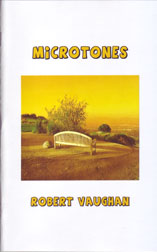
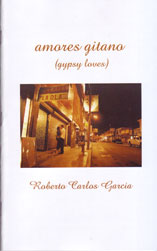
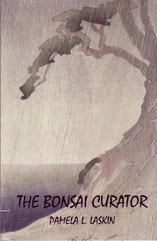
To keep this press alive and for us to keep going, please order books from Cervena Barva Press
and The Lost Bookshelf.
It helps the press survive. The press is growing and we are one of the most active presses in the
country!
Raves will be in the newsletter next month. It will be a bigger section than usually. So many
good books have been sent my way. I have bought some really good books to tell you about. It is
really exciting to read such great books so stay tuned…
Interviewed this month is Aimee Sands.
and "The Next Big Thing" An Interview With Susan Lewis.
Next month, an interview with Robert Vaughan will be
posted.

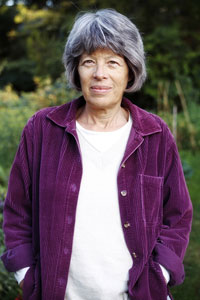
Talk a bit about your relationships with Ann Killough, Tam Lin
Neville, and Susana Roberts, with whom you oversee the Brookline
reading series.
Just for a little background, the Brookline Poetry Series is a 12-year-old venue that has featured Jean Valentine,
Tracy K. Smith, Eduardo Corral, Robert Pinsky, and Major Jackson, among many others. We also maintain an open mike
that attracts some really good working poets from the Boston area - people who are publishing in literary journals,
working on manuscripts. It's a venue that people return to month after month, and we follow the development of each
other's work at the open mike. Over the years, quite a few of us have published books. It's a really supportive venue,
but it's serious. There aren't too many other open mikes like it that I know of.
Dianne Ouelette, a Brookline poet, founded the Series in 2001. I remember I thought it was a bad idea. I can't
remember why. I was wrong! Anyway, when Dianne asked our writing group for help with the Series, I volunteered.
Only two months after we'd gotten the Series going, Dianne's ovarian cancer - that she thought she'd beaten - suddenly
came back. She died very quickly. She was only 44. She had a husband and two young daughters. There was a kind
of courage in her last days that I felt. The Series grew from there.
Sue joined me almost immediately to keep the Series going. She's a poet from a quarry town in Vermont, and she writes
gorgeous poems, full of love and stones. She's also a popular poetry teacher at Boston College.
A couple of years later, Ann got involved- she's a Southerner who settled in Brookline, with a huge extended family up
and down the East Coast. She won the PEN New England Award a few years ago for her extraordinary book Beloved Idea,
and the whole family showed up, coming all the way from DC and North Carolina.
Tam is a very recent and wonderful addition
to 'the wicked sisters,' as I sometimes call us. I think of
her as a person who 'hides her light under a bushel' - very
unassuming but erudite, knowledgeable about poets and poetry, a poetry reviewer, and author of two fine books.
In addition to all that, she and her husband Bert Stern recently founded a new press for poets over
60 called Off the Grid Press.
The Series is always a struggle. Where to find the time to select
poets, book them, publicize the readings, maintain the website? We all do the Series for free, and we all have multiple other
responsibilities. Sometimes we just barely pull a season out of our hats. We have meetings at Zaftig in
Coolidge Corner, and as we've gotten older, we have hilarious conversations that sound something like this:
"I really liked the poetry of that woman that brought her baby to the open mike, what was her name?"
"Oh yeah, I know who you mean." "Yeah, what was her name?" "She passed the baby to her husband when
she read." "Right. I remember them. He passed the baby back when he read."
"What were their names?" (It was Amy Clark and Jonathan Weinert). One way or the other, though,
we get it done, and with a lot of respect for each other's expertise and poetic taste. We try to
get consensus for every poet we book. We each have our favorites that we champion, and that can be
a good education for all of us about poets we haven't heard of, or don't know very well.
There are husbands and boyfriends who work on the Series too. Berred Ouellette, Dianne's widower, is a sound engineer,
and did our sound work for years. Now Ann's husband Joe Killough takes care of it. My partner, the poet Jim Henle,
has been invaluable in making suggestions for readers for the Series.
So it's kind of a family affair at this point, we've all known each
other for so long. We try to uphold the Series' underlying mission:
to be a venue that is both warm and serious about poetry. We're
proud the open mike has been called "Boston's best literary open
mike" by the Boston Globe.
What do you look for in writers you invite to read at the Brookline
series?
For the main featured poets, we have to love their work. We don't
all have to love their work, but we all have to at least like it.
For the opening readers, we keep an eye on people who read at the
open mike, and an eye on local literary journals and prizes - again,
looking for poetry we love. We strive for a mix of poets of color
and white poets, but it's not much of a mix yet.
You have done some work in public radio and television. What has
working in radio been like for you?
I loved radio and I still do. I love the sound of the human voice,
and I love the way radio leaves more room for the imagination than TV does. I moved to television
because, as a freelancer, I couldn't make enough money to live on in radio. I miss radio to this day.
I'm glad I can at least narrate my own film, and that I can still do interviews. Those two things
were the core of my radio work.
Talk about the inspiration behind your first book of poetry.
The best way I can answer that is to quote the opening inscription to my book: Through dark holes come birds,
then words, their brush and favor, nightlings startled off course. The Green-go Turn of Telling was 10 years
in the making. It's a poetic excavation of self, an evocation both of human wreckage, and of a rescuing force of
female wildness. It ends with a series of love poems - I'm not sure how to characterize those -
maybe 'fractured' is the word.
I also want to talk about what makes writing possible for me. When I was at Bennington, I gave a talk called
The Essential Echo. The idea is that writers need to know there's someone there who wants to hear them.
It can be a partner, a group, a friend, a community - Virginia Woolf had her husband Leonard and the
Bloomsbury circle. For me, my essential echo has first and foremost been the teachers at the William
Joiner Writers' Workshops, particularly Eva Bourke, Fred Marchant, Bruce Weigl, and Martha Collins.
The emphasis in the poetry classes there is on generating new work. For me, that was 'permission to write,'
a concept that I've heard other women writers talk about. I needed the assignments to get me going.
And the Joiner faculty had (and have) a way of receiving students' work that makes you feel like maybe you
have something to offer. I would never have imagined going to Bennington for an MFA, much less
publishing a book, without the Joiner teachers.
My essential echo also includes the community surrounding the Brookline Poetry Series. I like to be heard at the open mike there.
Do you see a responsibility on the part of artists (visual and
otherwise) to take on social issues such as racism, as you have in
much of your documentary work?
I think all of us, artists and otherwise, need to think about race
and how it manifests in our daily lives. We need to learn to notice
the little things and the big things - like disrespect toward a
person of color at a cash register, or the newspaper article
reporting that the flu is affecting communities of color more than
white communities. Within the poetry community, this means that if you see something happening
that doesn't seem quite right, racially speaking, you have a responsibility to say something. I think this
is especially true for white people, because we white people tend to leave all the speaking-up to people
of color. It's really hard to speak up, but I figure with practice we can get better at it.
However, I don't believe all artists have a responsibility to take on
race in their work, because the work has its own imperatives. You
have to obey those imperatives. Sometimes race comes through in the work, sometimes it doesn't.
In general, I find political poetry
(that is, good political poetry) to be extremely difficult to write.
But the imperatives of my film work have been all about race
for a long time.
Do you see your work as a filmmaker, poet, and radio / tv producer
as coalescing into a single mission, or do you regard these aspects
of your work separately?
My poetry definitely informs my film, which is called What Makes Me White? Poetry has taught me to trust
my voice, and also to trust my sense of imagery. When I'm writing the narration or directing a scene, that
trust helps me immeasurably. It has deepened the film, and helped me to take big creative risks with it.
Also, I have a poem that opens the film. It's the only one that I've ever been able to write about
race, and it gave me the title of the film. I couldn't make the film the way I'm making it if I weren't
a poet.
Let us know a bit about your travels to Mexico and elsewhere. How
have these cultural experiences shaped your work and passions?
I haven't traveled that much, actually. Mexico was my longest trip - about 5 months. My goal was to learn Spanish, and I did.
The main thing I learned in Mexico, in addition to Spanish, was that the U.S. isn't the center of the world.
In Mexico, Mexico is the center of the world: its art, its history, its political struggles.
The Mexicans are a very proud people, and very patriotic. I had no idea. I guess the trip was part of my
racial education, although I wasn't aware of it at the time. So I learned humility there, and an
awareness of my own unconscious American - arrogance, I guess is the word.
Eduardo Corral read for the Series in November, and he pointed out that he doesn't italicize or translate the Spanish words in his
poems. As I understood him, his intention was to give English and Spanish equal weight. That made a deep kind of sense to me.
Reading his work later, I could understand most of the Spanish words, and I thought, 'This is what it means to
be an American now' in some way - to move among languages. The word 'American' is changing its meaning, I think.
When do you best like to write poetry? Does this schedule differ
from that of your other work?
I don't really like to talk about my writing process. That's
something I need to keep private.

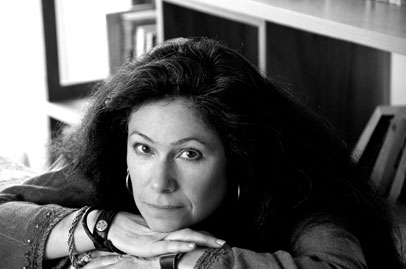
What is the working title of the book?
"How to Be Another."
Where did the idea come from for the book?
I was experimenting with a range of variations on the prose poem, from more-or-less abstract, aporetic
verbal collages, to meditations, to parables and tales, when I realized they had a certain thematic
through-line, namely, empathy - its necessity as well as its ultimate unattainability. Hence the title,
"How to Be Another." What's more, I realized my dissimilar approaches could be understood as different
ways to elucidate, illustrate, or convey that thematic through-line. So I divided the collection into
four sections: i.e., e.g., Rx, and vis.
What genre does your book fall under?
Prose poetry.
What actors would you choose to play the part of your characters in a movie rendition?
Most of the parts are for CGI-animated impossibilities. But there are ordinary humans in these tales as well.
Chandler Riggs (who plays Carl in The Walking Dead) would be great for "The Kiss." Elisabeth Moss
(who plays Peggy in Mad Men) would be amazing in a number of these pieces. "Half-Life" requires a
wolf-like white dog, very much like my Samoyed, Loki - although I suspect he has no real interest
in acting!
What is the one sentence synopsis of your book?
"Between anything & the real thing, jaws snap."
How long did it take you to write the first draft of the manuscript?
Three or four years, give or take a few.
Who or what inspired you to write this book?
Borges, Cortazar, Rimbaud, Mallarme, Russell Edson, Wittgenstein, to name a few. Discovering the breadth of
potential for the short prose form mined by these great writers felt like a homecoming for one impulse of
my writing self.
What else about your book might pique the reader's interest?
Among its cabinet of oddities are boys who "flap their wings and pray for rain," a rebellious moon,
intransigent scallops, a dog who can deep sea dive, "clouds which act like railroads, taking anything
anywhere," a recriminatory moth, and a man whose life is an art exhibit.
Will your book be self-published or represented by an agency?
It will be published by Cervena Barva Press later this year.
My tagged writers for next Wednesday are:
Terese Svoboda, "Dogs Are Not Cats" (MadHat Press, 2013)
Norma Cole, "Distraction"
Sheila Murphy, "American Ghazals"
Gloria Mindock, "Screaming for Paul"


If you would like to be added to my monthly e-mail newsletter, which gives information on readings,
book signings, contests, workshops, and other related topics...
To subscribe to the newsletter send an email to:
newsletter@cervenabarvapress.com
with "newsletter" or "subscribe" in the subject line.
To unsubscribe from the newsletter send an email to:
unsubscribenewsletter@cervenabarvapress.com
with "unsubscribe" in the subject line.

Index |
Bookstore |
Image Gallery |
Submissions |
Newsletter |
Readings |
Interviews |
Book Reviews |
Workshops |
Fundraising |
Contact |
Links
Copyright © 2005-2013 ČERVENÁ BARVA PRESS - All
Rights Reserved
|

